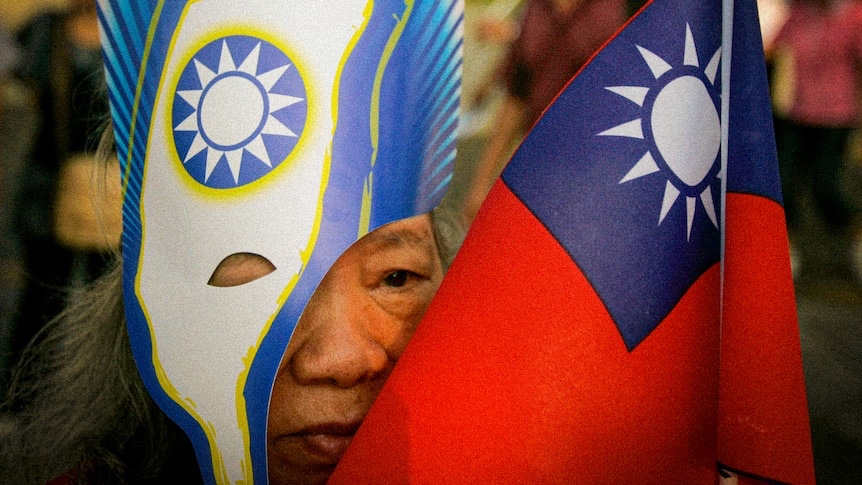
China takes US withdrawal from Afghanistan as an opportunity for some sabre-rattling in Taiwan
Tuesday 17 Aug 2021 at 11:36am
Chinese state media and nationalistic commentators have leapt on America’s disastrous retreat from Afghanistan to claim America will not defend the people of the next potential flashpoint in Asia: Taiwan.
Online reaction in China to the US withdrawal has focused on the general demise of American power and several commentators have drawn comparisons to a potential future conflict over the island to China’s east.
“If the US gets involved in a war over Taiwan, it has even less chance of success, and will involve bottomless costs”, Hu Xijin, an influential nationalistic state media commentator, said in a video.
The editor of the Global Times published several pieces taking aim at what he called Taiwan “separatists”.
“Just think how many American soldiers’ lives would be spent on Taiwan, and how many trillions of dollars,” he wrote in one editorial.
While many people in Taiwan believe they are a separate nation, Beijing sees the island as a province destined to be brought under Communist control.
A 40-year-old US law states that the United States will provide political and military support for Taiwan.
But despite decades of arms sales, the US remains strategically ambiguous on whether it would ever directly intervene to defend Taiwan from a Chinese attack.
It has long been feared that a dispute over the island would drag the two rival superpowers, who both possess nuclear weapons, into war.
Beijing follows up editorials with drills
As the hot takes rolled in, the Chinese military announced it was sending warships, anti-submarine warfare aircraft and fighter jets to areas south of Taiwan for live-fire assault drills.
“I hope that the Beijing leaders would understand that Taiwan is no Afghanistan,” said Alexander Huang, a former Taiwanese government official, now at Tamkang University.
He told the ABC that the US withdrawal has raised questions about how committed America would be to Taiwan, but dismissed the Chinese state media comparisons with Afghanistan.
“Of course Beijing might play psychological operations against the general public in Taiwan to try to soften their will and make them think the American commitment is in doubt,” he said.
China’s Communist Party has vowed to take control of Taiwan and its 25 million people by 2049 at the latest, regardless of what Taiwanese themselves think.
China’s leader Xi Jinping has repeatedly expressed a desire for a peaceful takeover, maintaining an offer of “One Country, Two Systems” — the same deal that saw Hong Kong last 23 years before Beijing politically clamped the city.
But China maintains the threat of military force if persuasion fails, an option Beijing would prefer to avoid.
“State media actively promulgates stories and editorials that Taiwan has no fighting chance and should simply surrender. The commentary drawing parallels between Afghanistan and Taiwan is yet another case of it,” said Jessica Drun, a non-resident fellow with the US-based Project2049 Institute.
“We need to give pause around these narratives, not play too hard into them.
“The circumstances and national security priorities in Afghanistan and a Taiwan Strait contingency are so dissimilar.”
‘They feel they’ve eroded America’s military edge‘
Consecutive landslide election defeats in Taiwan for the main political party seeking more cooperative ties with China has underlined how unappealing such an arrangement appears to most Taiwanese.
And with President Tsai Ing-wen’s DPP party over the past six years leaning more heavily towards an independent identity separate to China, Mr Xi has been ratcheting up military pressure.
“I think the Afghanistan withdrawal must make the Chinese more confident that if they push hard on Taiwan, America will cave,” said Hugh White, a defence analyst at The Australian National University.
Professor White told the ABC that America’s rapid victory against Iraq during the Gulf War operation known as Desert Storm in 1991 shocked the Chinese People’s Liberation Army.
“I remember speaking to senior PLA figures and they were very impressed. So now when the opposite occurs, you’re going to get converse thinking from them,” he said.
Professor White believes the pressures and incentives for China’s leader Xi Jinping to act sooner rather than later are growing.
“I think they feel they’ve eroded America’s military edge sufficiently, and Xi wants it on his banner,” he said.
Last month, China demanded the US stop arms sales and military interactions with Taiwan, as the Biden administration announced plans for a further $US750 million ($1.03 billion) sale of howitzer weapons systems.
Outmatched in military might, Taiwan’s chances of withstanding a People’s Liberation Army offensive would heavily rely on US support, and China’s PLA is a far more powerful foe than the Taliban.
The stakes, though, are much higher.
Why a US-China conflict is the nightmare scenario
Being able to help Taiwan ward off a Communist takeover is integral to America’s reputation in East Asia, on which alliances with Australia, Japan, South Korea and several south-east Asian nations depend.
Most analysts believe attempting to take control of Taiwan would be a costly, bloody conflict for China to pursue and is therefore not imminent.
But the 2049 deadline that Beijing has set creates a window that narrows with every year.
“At three in the morning, if Joe Biden has to make the call to commit maritime forces to the biggest war the world has seen since 1945, I wouldn’t at all be surprised if the Chinese calculate that Biden would pull back,” said Hugh White.
“It’s bad news if they’re right, because America would cease to be an East Asian power.
“And it’s bad news if the US doesn’t cave in, because we’d have the first war between great powers since 1945.”
No comments:
Post a Comment